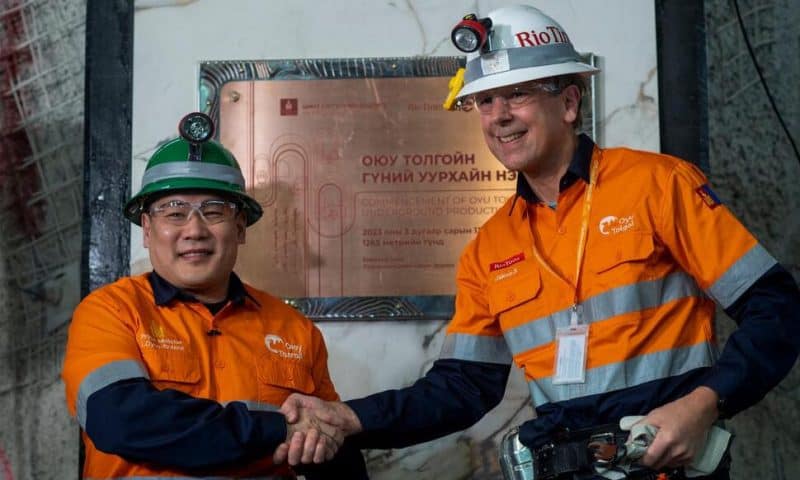Mongolia’s prime minister says the North Asian nation will channel revenue from rising copper exports into an economic development fund to reap more benefit from its mineral riches and root out corruption
BEIJING — Mongolia plans to channel revenue from rising copper exports into an economic development fund as part of changes to reap more benefit from its mineral riches and root out corruption, the North Asian nation’s prime minister said in an interview Tuesday following the opening of a major expansion of its biggest mine.
Luvsannamsrain Oyun-Erdene attended a ceremony 1,300 meters (4,300 feet) below ground to mark the start of underground production Monday at the Oyu Tolgoi mine in the Gobi Desert in southern Mongolia. He was joined by executives of Rio Tinto, the Australian mining giant that owns a 66% stake in the mine. The government owns the rest.
The multibillion-dollar expansion of Oyu Tolgoi is the latest effort to generate prosperity from Mongolia’s copper, coal, gold and other minerals following three decades of complaints about economic malaise and corruption.
Oyun-Erdene, who took office in 2021, represents a younger generation following leaders who grew up under the Soviet-allied former communist government. At 42, the politician with the burly build of an American college football player has a master’s degree in public policy from the Harvard Kennedy School and experience working abroad.
“We are working hard to eliminate the old culture and introduce a new mindset,” the prime minister said by video link from Ulan Bator, the Mongolian capital.
Mongolia gets more than 90% of its export revenue from minerals and is benefiting from the surge in global sales of electric cars that use more than a mile (1,500 meters) of copper wire in their motors.
Oyun-Erdene said his government plans to invest copper revenue in public health, education and developing technology, tourism and other new industries. He said his government will propose a law to create a sovereign wealth fund during the parliament session that begins Wednesday.
“We do believe this will be a historic moment for the livelihoods and standard of living of the people of Mongolia,” Oyun-Erdene said. He said his government wants to make “the wealth and natural resources of Mongolia beneficial and equally distributed to all the people of Mongolia.”
Mongolia’s economic growth is forecast by the International Monetary Fund to accelerate this year to 5% from last year’s 2.5%. But households have struggled with inflation that spiked to 14% last year. Economic output per person is about $4,500, barely one-third of neighboring China’s level.
Government plans call for more than doubling average economic output for Mongolia’s 3.2 million people to $10,000 by 2030.
The planned fund includes a pool of money for housing, education and health, a separate fund for development projects and a “stabilization fund” to cushion against changes in commodity prices, according to Oyun. That is similar to sovereign wealth funds operated by Chile, another big copper exporter, and oil producers to invest natural resource revenues.
Other planned investments to “enhance our economic independence” include two hydroelectric power plants to reduce Mongolia’s need for electricity from its giant neighbors, China and Russia, according to Oyun-Erdene.
To extract more value from its copper, Mongolia announced an agreement this week with Rio Tinto to look at building a smelter.
Oyu Tolgoi, about 550 kilometers (350 miles) south of Ulan Bator, started digging copper from an open pit in 2012 before developing the underground mine that its operators say is more valuable. The mine, with a workforce of 20,000, says it has paid $4 billion in taxes and other fees to the government.
Production is forecast to rise to 500,000 tons per year, or enough to equip 6 million electric vehicles. Its operators say that would make Oyu Tolgoi the world’s fourth-largest copper mine.
“People of Mongolia will benefit greatly from this project,” Oyun-Erdene, wearing a green helmet with a mining lamp, said Monday at a ceremony with Rio Tinto CEO Jakob Stausholm.
The mine faces complaints it uses too much scarce water in its desert setting and has displaced traditional nomadic herders. Activists say Rio Tinto and the government failed to carry out a 2017 agreement to compensate them.
The mine’s operator responds that it recycles most of its water and has paid the provincial government some $40.5 million for what it draws from local sources. The company says it has repaired herder wells and installed solar panels to power pumps at 40 of them.
“We are having talks with Oyu Tolgoi on how to improve the environment and especially how we can address the issue of environmental degradation,” Oyun-Erdene said.
He acknowledged complaints about corruption in the government-dominated mining industry, saying his administration has declared this an “anti-corruption year” and is carrying out a five-part plan based on advice from Transparency International, a global anti-graft watchdog.
Mongolia ranked 116th among countries last year in Transparency International’s “corruption perceptions index,” based on a survey of businesspeople and experts. That was down from No. 94 in 2012.
In December, thousands of people protested in freezing weather in Ulan Bator after Oyun-Erdene’s government announced an investigation into officials accused of profiting from the improper diversion of coal exports in 2013-19.
The government aims to make mining more transparent and to reduce political influence by turning state-owned enterprises into companies with publicly traded shares. Oyun-Erdene said.
“Some parliament members are involved in mining and own companies. This is a real challenge,” Oyun-Erdene said. “We have to make the private interests of parliament members and public officials separate from the public interests of Mongolia.”

